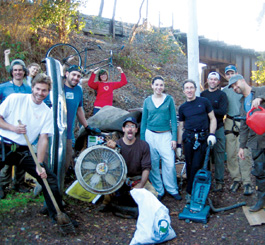home | metro santa cruz index | currents

Photo courtesy Save Our Shores
PERHAPS THIS YEAR, A KITCHEN SINK: Last year's cleanup of Aptos Creek yielded a vacuum cleaner, an automobile fender and a fan, all unearthed by volunteers in three hours on Coastal Cleanup Day.
Trash Day
This Saturday we're just tidyin' up the beaches a little
By Maria Grusauskas
IT'S BEEN dubbed "the largest garbage collection" by the Guinness Book of World Records (1993) for a reason. Since the annual California Coastal Cleanup Day began in 1985, volunteers have removed more than 14 million pounds of trash and recyclables from the state's beaches and waterways, including items ranging from cigarette butts and plastic pieces to refrigerators, cars and, yes, pianos.
This year, local organization Save Our Shores is once again rolling up its sleeves to help coordinate Coastal Cleanup Day in Santa Cruz County, which coincides with the Ocean Conservancy's International Coastal Cleanup Day, and for the first time it's extending its efforts to coordinate the cleanup in Monterey County as well. Laura Kasa, executive director of Save Our Shores, predicts that at least 4,000 volunteers will turn out in Santa Cruz County and at least 2,000 in Monterey County. All of them will want to be wearing gloves.
"The most common debris found at these cleanups are still cigarette butts," says Kasa. In the 130 beach and 24 river cleanups that SOS has coordinated this year, 34,592 cigarette butts have been collected, and Kasa predicts that thousands more will be gathered on Saturday's cleanup. Small pieces of unidentified plastic are the next most commonly found trash littering the beaches, with 20,783 plastic pieces found this year alone.
At last year's cleanup, Save Our Shores reports that 3,802 volunteers in Santa Cruz County picked up 9,012 pounds of trash and 3,904 pounds of recycling. This year, there will be 45 cleanup sites in Santa Cruz County stretching as far north as Waddell Creek Beach and south to Palm State Beach, just past Sunset, and including 12 river sites. SCUBA and kayak groups are taking the garbage hunt into the swell, departing from the Santa Cruz municipal wharf and Santa Cruz Harbor.
The California Coastal Commission estimates that about 10,000 kilograms of oil (or 67 barrels) were used to produce the plastic bags used during the 2009 cleanup. To reduce the environmental impact of this year's cleanup, SOS encourages volunteers to bike or carpool and to bring their own gear. The group recommends a bucket or reusable bag, a lightweight pair of gardening gloves, a reusable water bottle and a "trash free" lunch.
COASTAL CLEANUP DAY is Saturday, Sept. 25, 9am–noon. To pre-register, which helps spread out volunteers among the needed beaches, visit www.saveourshores.org.
Everything Old's New Again
The climate is changing, the population is exploding and humans will need a little re-education if extinction isn't their cup of tea.
The third Santa Cruz Reskilling Expo is backtracking to the beginning of the consumer chain and introducing the DIY spirit into modern skill sets, adding production knowledge to the repertoire of the can-opening masses. At this Sunday's day-long event, lectures about the future of resources will be interspersed with practical knowledge about things like beekeeping and home canning.
"'Reskilling' is basically an attempt to show people how to navigate a changing world, a changing climate," says Nicola Wagner, an adviser for this autumn's expo. "People are realizing that their food sources are coming from corporate sources, that their water is corporate-controlled ... It's how to build resiliency by knowing how to look after yourself. To teach you how to keep a few chickens, store food, store energy. We're showing skills that reduce your impact on the environment."
Racing against resource shortages and the upcoming apocalypse, the expo of forgotten skills is designed to boost awareness of issues and provide ways to be immediately sustainable.
"It's a way to simplify our lives and not be so wasteful," says former Reskilling attendee Barry Antler. "From a survivalist point of view, if a major earthquake were to hit, most of us wouldn't know what to do, how to make a compost toilet or anything like that."
Compost toilets are worlds without waste, and since urea, a byproduct of urine, is full of the plant and soil nutrient nitrogen, a future without plumbing would make compost simultaneously a disposal system and a fertilizer. Although the compost toilet hasn't made an entrance into Antler's daily life, post expo finds him making his own sauerkraut and bread, bypassing grocery stores and farmer's markets in favor of recipes easy enough to use for a thousand more years.
"For me there's just something about relearning these skills our grandparents used to know," Antler says. "You get intimidated by cooking bread, but then you realize how simple it is, that these things are usually combinations of skills we already know."
Kate Jacobson
THE RESKILLING EXPO will take place on Sunday, Sept. 26, 10am–4pm at Temple Beth El, 3055 Porter Gulch Road, Aptos. Classes are a half-hour each. The Expo is free, but donations up to $25 are encouraged.
Send letters to the editor here.
|
|
|
|
|
|